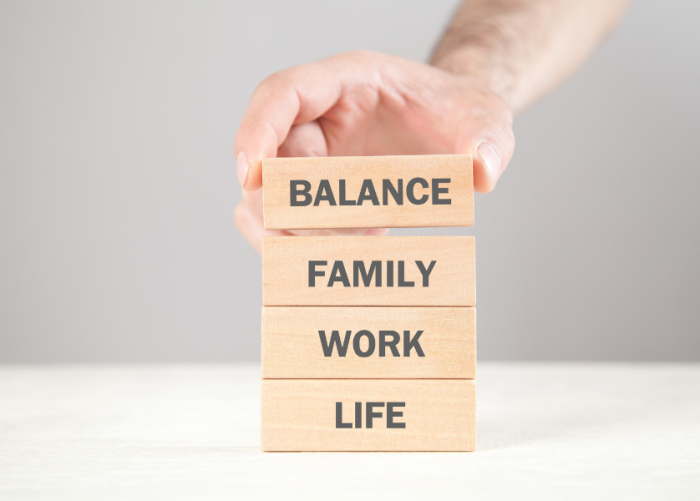In this day and age when most families are dual income, juggling child-raising responsibilities with the demands of work can take a toll on many parents’ personal and professional lives.
With each child having a different schedule and different needs as they grow up where one may be entering kindergarten while the other just be beginning to walk and talk, who will be there to witness these milestones or take care of their daily requirements when both parents have to spend most of their daytime hours away from their children? And therein lies the elusive concept of Work-Life Balance. Is it a myth or can it be achieved?
What is Work-Life Balance?
 Traditionally, the term Work-Life balance[1] was defined as the division of one’s time and focus between working, family and leisure activities where people worked eight hours a day, rested eight hours and spent eight hours of personal time, thereby totalling the perfect balance of the 24 hours we get in a day.
Traditionally, the term Work-Life balance[1] was defined as the division of one’s time and focus between working, family and leisure activities where people worked eight hours a day, rested eight hours and spent eight hours of personal time, thereby totalling the perfect balance of the 24 hours we get in a day.
In reality, however, life cannot be divided into neat little packages where one can flip on or off a switch according to the hours. In the course of the variables in any given day or month or year such as changing work functions and duties or the addition of a new family member, some areas will surely overlap the other. When one area such as work demands more of your energy and time, it will invariably mean you will have less time and energy to handle your other responsibilities or passions.
Work-Life Balance in Malaysia
 In 2017, a Malaysia’s Healthiest Workplace survey[2] by AIA revealed that on average, Malaysians worked 15 hours more than their contracted hours each week. In 2019, a report in ‘This Week in Asia[3]’ said workers in Kuala Lumpur, Singapore and Tokyo had some of the worst Work-Life Balance in the world. In 2022, a Work-Life Balance survey by KISI[4] – a tech company – revealed almost the same thing, that Kuala Lumpur was the third most overworked city among 49 major cities in the world.
In 2017, a Malaysia’s Healthiest Workplace survey[2] by AIA revealed that on average, Malaysians worked 15 hours more than their contracted hours each week. In 2019, a report in ‘This Week in Asia[3]’ said workers in Kuala Lumpur, Singapore and Tokyo had some of the worst Work-Life Balance in the world. In 2022, a Work-Life Balance survey by KISI[4] – a tech company – revealed almost the same thing, that Kuala Lumpur was the third most overworked city among 49 major cities in the world.
The point is – Malaysia hasn’t changed much of its work culture despite the hard lessons brought about by Covid 19. During the three pandemic years, remote work or Work From Home was introduced along with flexi-hours and flexible work arrangements to cope with the sudden disruptions but many businesses have reverted back to their traditional style of operations once going back to the office fulltime was permitted.
Things, however, changed in the mindset of the workforce. They realised that money isn’t everything in life. A recruitment services firm, Michael Page Malaysia, launched a talents trend report in 2022 titled The Great X[5] survey and found that as high as 65% of respondents in Malaysia were willing to forgo pay rise, bonuses, promotions and other financial motivators for better Work-Life Balance, overall well-being and happiness.
Some companies have picked up on the cues in that applying technology and allowing flexibility for their post-Covid workforce were now a necessity to ensure staff retainment and business continuity.
Today, working and having a career while raising a family and attaining financial stability are aspects of life that cannot be separated. For working parents, the dichotomy isn’t so much about dividing an equal proportion of time between professional and personal life but an integration of the two to find ways for both aspects to coexist peacefully. Hence Work-Life Integration has come to the fore where finding solutions to how and when to spend your time and energy, what’s important and meaningful and what brings fulfilment have become the priorities. It’s not easy to achieve because it means having to hold a constant negotiation of your time, efforts, focus and emotional investment while maintaining financial stability in the family. There’s no formula, because everybody’s life is different but here are some things you can consider implementing while finding ways to balance your work and career, personal goals, marriage, parenting, childcare and self-care.
10 Ways to Find that Balance
 1: Get Support and Involvement for Childcare and Housework
1: Get Support and Involvement for Childcare and Housework
Of the two working parents, it is a known fact that the bulk of child-raising and homemaking often falls upon the mother. From handling a full-time job to caring for the children to cooking and cleaning while being part-time driver and tuition teacher for her children’s schoolwork or extra-curricular activities, it is no surprise why many mothers consider quitting work and being a stay-at-home parent. It is a dangerous thought because you could lose your financial independence and your say in financial matters of the household.
If you are overwhelmed, consider asking your spouse to help out more. He could take over the shuttling duties, do more of the household chores, take over the homework time and generally participate more with his children’s daily play and activities while you find some rest time in between.
Nowadays, day-care or childcare services, part time and fulltime maids as well as transport services such as school busses are easily available. Even food delivery and online shopping are available. Reach out to your network to find the support you need.
2: Create a Sustainable Schedule
Whether or not you work from home, run a business or go in to the office fulltime, creating a working daily schedule[6] around your time is very important because it builds routine into what could easily become chaos. It’s hard enough finding time for yourself in between all of your parenting and work responsibilities, not to mention waste a lot of time commuting to and from work if you have to go in to the office, taking care of a myriad of daily events on an adhoc basis could have you burning the candle at both ends.
Routines are all important because they provide structure, direction and create an opportunity to improve efficiency, productivity and sustainability. You set up time blocks and will know by what time you should be doing this or that. This will prevent you from working overtime or dilly-dallying while it also teaches your children to recognise and respect your working hours as well as the timetable in the household.
3: Speak Honestly with your Children
 You’ll be surprised to know how many children don’t understand why you have to leave them and go to work every day. You will also be surprised how many children will understand once you have an honest conversation[7] with them. Explain to them why you have to go to work, and the connection between work, your contribution to society and where money comes from to sustain the family’s needs. Children need to understand that you must complete your work obligations but you can still spend quality time with them when you’re done working. Consider giving them their own jobs too so that they can model after you and feel like a contributing member of the family.
You’ll be surprised to know how many children don’t understand why you have to leave them and go to work every day. You will also be surprised how many children will understand once you have an honest conversation[7] with them. Explain to them why you have to go to work, and the connection between work, your contribution to society and where money comes from to sustain the family’s needs. Children need to understand that you must complete your work obligations but you can still spend quality time with them when you’re done working. Consider giving them their own jobs too so that they can model after you and feel like a contributing member of the family.
4: Ask for Flexibility in the Workplace
Having an open, honest conversation about your needs and those of your employer and team can also lead to productive solutions. This can include flexitime, job sharing, and other creative solutions.
5: Take Breaks Frequently
 When at work, take breaks[8] now and then. Even a 30-second microbreak can improve concentration, reduce stress and keep you feeling engaged. This is especially so if you are working from home as children can be making noise and interrupting. Set up a dedicated space such as a workstation where you can shut the door and fully concentrate on your tasks. Then get up to stretch or walk around every one or two hours to refresh. This will allow the brain to consolidate and re-energise. During your lunch hour, take the time to rest and replenish yourself.
When at work, take breaks[8] now and then. Even a 30-second microbreak can improve concentration, reduce stress and keep you feeling engaged. This is especially so if you are working from home as children can be making noise and interrupting. Set up a dedicated space such as a workstation where you can shut the door and fully concentrate on your tasks. Then get up to stretch or walk around every one or two hours to refresh. This will allow the brain to consolidate and re-energise. During your lunch hour, take the time to rest and replenish yourself.
6: Learn to say No and Set Up Boundaries
Learning to say No is an essential part of setting up boundaries. It applies to both home life and work life.
At work, set and communicate your work hours to your managers, colleagues and customers so that you can establish clear boundaries. This should include when you will work and when you will not be able to communicate, including via office WhatsApp chatgroups that could encroach into your private time. If a manager is requesting that you take on an extra work project or last minute assignment, suggest an alternative method or time adjustment for completing the project so that you do not have to compromise family time.
At home, the same boundaries apply to your children. Just because you are at home doesn’t mean they can interrupt you every second of the day and night. This is why setting up a schedule is so important. Unless there is a real emergency, your children should not be coming in to “disturb” you during your designated time for work. This is especially so if you work from home.
Setting up these boundaries also mean that you yourself put away your gadgets and not allow yourself to work or be distracted by social media when you are with your children. Giving your children your whole attention during their designated times will effectively teach them not to demand for your attention during your designated time. There is always a place and time for everything. Likewise, do not allow yourself to get distracted with home responsibilities while at work, unless there is an emergency.
7: Prioritise Quality Time
 With only so many hours in a day and so many things to fit into those hours, parents need to think about putting priority[9] on doing what’s really important versus what can be differed to another time or somebody else.
With only so many hours in a day and so many things to fit into those hours, parents need to think about putting priority[9] on doing what’s really important versus what can be differed to another time or somebody else.
For example, do you really have to be a perfectionist, spending an inordinate amount of time and energy doing and redoing something until you get it perfect or can you let it go and spend that energy engaging with your children instead? Do the windows, light fixtures and fans in your home need to be sparkling or can you get a maid to clean them instead? Don’t get all bogged down and stressed up sweating the small stuff. Doing household chores don’t need parental involvement whereas spending quality time showing love, communicating, supporting, and teaching values to your children does.
Prioritising quality time with the family means putting precedence on what truly matters. One way to do this is to find at least half an hour everyday to spend focused, calm time with your children, just talking or playing or even doing a household chore together. Give them your undivided attention while you ask them open-ended questions like: How was your day? What do you think of your new teacher? Be genuinely curious and interested in what they have to say.
8: Set Realistic Goals and Re-evaluate Expectations
As a working parent, you may have high expectations for your career and home life. However, setting high targets to hit when you know you will have to push yourself very hard to achieve them will only cause you and your family undue stress.
If you re-evaluate your expectations and set more realistic goals, you will have a happier home and a more productive work life because you will be able to meet your expectations and achieve success more easily.
9: Practice Self-Care
Being present all the time for your children and desperately needing a break from them are not mutually exclusive. A big part of being a well-balanced, working parent is allowing yourself to take a break[10]. In fact, breaks are necessary. If you don’t get the rest you need, you are less likely to be the engaged, responsive, playful parent you want to be for your child.
Allow yourself to step away from work and home and do something you enjoy like spending time on a night time skincare routine, going for a walk, taking up a hobby, catching up with a friend over dinner or taking a dance or baking or exercise class. Do something for yourself just for you to practice self-care because self-care and mental health are tied together and parental stress and burnout are very real and do happen very often.
Part of self-care also means making sure you get adequate rest, eating the foods your body needs and drinking plenty of water. It’s about being kind to yourself. Find the time for it.
10: Ease the Mental Load off your Child’s Nutritional Needs
Part of one’s parenting responsibility is ensuring that your child receives the nutrition that he needs during his developmental years. Every parent knows that the first three years of a child’s life is the fastest he will ever grow in his lifetime. While his muscles, sinews, cells, tissues, blood and blood vessels as well as bones and teeth are forming, elongating and multiplying at an exponential rate, his learning capacity and mental, emotional and behavioural development are also keeping pace. For example, a child’s brain development reaches 90% before he reaches the age five[11] and his head circumference reaches almost to adult size by the age of six[12]. Obviously, this is the window of time when a child needs to receive the nutrition he needs to develop to his best potential.
While it can be said that children, especially toddlers, should get their nutritional needs met by food alone, working parents cannot be around to cook and ensure that adequate nutrients, vitamins and minerals are accounted for and consumed at every meal.
Moreover it is near impossible to make a toddler eat 37 servings of spinach, 40 servings of salmon, 200g of tofu or 6.5 servings of cheese sticks a day to meet the 700mg of Calcium – the recommended dosage[13] − that a toddler needs a day. Lack of just this one mineral such as Calcium can lead to a condition called Rickets where the child’s bones become soft, weak and deformed resulting in bowed legs and curvature of the spine.
The easiest solution to avert Calcium deficiency is by drinking milk, not just any milk but formula milk made specially to meet the nutritional requirements of fast-growing toddlers and young children.
 Morinaga Chil-kid, for example, is packed with 27 vitamins and minerals including vitamins A, B1, B6, B12, C, D, E and K, plus Folic Acid and minerals Zinc, Calcium, Iron as well as nutrients such as ARA+DHA, Inositol, Nucleotides and dietary fibre Galacto-oligosaccharides (GOS), Omega 3&6 LCPs (long-chain polyunsaturated fatty acids) and many more. All 45 nutrients are formulated in a balanced ratio of protein, fat and energy specially made suitable for Asian children aged one to seven.
Morinaga Chil-kid, for example, is packed with 27 vitamins and minerals including vitamins A, B1, B6, B12, C, D, E and K, plus Folic Acid and minerals Zinc, Calcium, Iron as well as nutrients such as ARA+DHA, Inositol, Nucleotides and dietary fibre Galacto-oligosaccharides (GOS), Omega 3&6 LCPs (long-chain polyunsaturated fatty acids) and many more. All 45 nutrients are formulated in a balanced ratio of protein, fat and energy specially made suitable for Asian children aged one to seven.
With just two servings of Morinaga Chil-kid a day complemented by food, the formula will help children achieve their daily Recommended Nutrition Intake (RNI).
Morinaga Chil-kid is a Japanese formulation that is wholly produced and packed in a state-of-the-art plant in the Netherlands where it goes through stringent quality assurance processes and a double inspection in Japan before it is released into the market.
For more information on Morinaga Chil-kid, please visit the website here.







